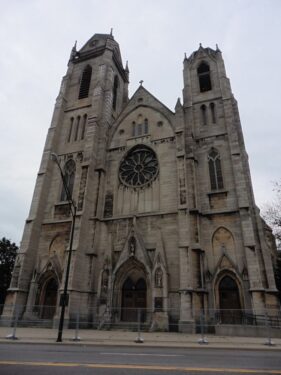
PROSPECT HEIGHTS — In 2022, the Diocese of Buffalo sold one of its properties to a holding company, which intended to convert the church and its existing complex into an Islamic center. Now, two years later, a priest’s viral social media post is causing a stir.
On Aug. 11, a “Father R. Vierling” posted on X four images of St. Ann’s Catholic Church with the caption: “St. Anne’s (sic) Church, Buffalo, NY. Permanently closed. Sold to the Islamic community for $250,000 who are converting the historic church into a mosque.”
The post, which has been viewed more than 11 million times, generated many angry comments, with some directed at Muslims. Things got so bad that Father Vierling had to follow up with a post to try and quell things.
“No anger should be directed against the Islamic community.” he said on X. “No doubt the changing demographics of the area and the inability to financially support the complex made the continuance of St. Ann as a viable parish possible.”
Despite what many people inferred from Father Vierling’s post, the sale of the church, and any potential conversion of it, are canonically sound and actually a common occurrence.
Per the Diocese of Buffalo, the sale of the former St. Ann’s Church property complex — which contains the former church, a school, and a convent — closed on Nov. 16, 2022, for $250,000. The property was purchased by Buffalo Crescent Holdings, Inc., which, according to reports at the time, purchased the property with the intent to convert it into a downtown Islamic Center.
However, nowhere in the diocese’s news release or on the current Downtown Islamic Center website does it note that the purchase was made with the intention of converting the church into a mosque. In addition, the Downtown Islamic Center’s website has not posted an update on the project since July 15, 2022 — before the purchase was even finalized — but does mention that it is collecting donations. The organization did not immediately respond to a request for comment from The Tablet.
Before the deal was completed, the diocese relegated the property to “profane use,” which in canonical terms means making it secular. Per canon law, if a church cannot be used in any way for divine worship and there is no possibility of repairing it, the diocesan bishop can relegate it to secular use, allowing a buyer to use it however they wish, so long as the purpose is not sacrilegious, immoral, or scandalous.
Joe Martone, the communications director in the Diocese of Buffalo, confirmed to The Tablet that this process took place at St. Ann’s.
“It’s a canon law process to convert it to profane use, which is not religious use, and that process did occur with St. Ann’s,” Martone said. “We’ve had other properties that we’ve sold within the diocese that have been sold to other religious groups that have used them for their faith services, so as a general rule, the diocese does not have a problem with that.”
According to the diocese, St. Ann’s Church was completed in 1886 and was an active parish in the Diocese of Buffalo until 2007, when it merged with Saints Columba-Brigid Parish. All activities ceased at St. Ann’s in 2013.
Martone said the main reason the church closed was its physical condition. At the time activities ceased, he said the diocese had received an estimate from a local firm that repairs to the church would have cost the diocese $30.2 million (about $40 million today), which was unaffordable.
“It needed a tremendous amount of money in repairs,” Martone explained. “The work that was needed was incredibly expensive and beyond the scope of the diocese.”
The Diocese of Buffalo has faced financial difficulties since declaring bankruptcy in 2020, as it works to address 900 allegations of sexual abuse involving priests, religious figures, and other diocesan employees.
Church closures and sales happen frequently all over the country, and many times the properties are purchased by other faith groups, which is allowed so long as the proper canonical process is followed.
The reverse is also true. For example, back in 2012, the Diocese of Orange, California, purchased the Crystal Cathedral from a Protestant denomination for $57 million. The cathedral has since become an epicenter of Catholic life for the diocese and a touchstone for Catholics nationwide.
